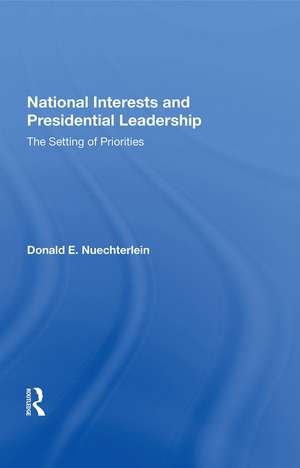National Interests And Presidential Leadership: The Setting Of Priorities
Autor Donald E. Nuechterleinen Limba Engleză Hardback – 7 iun 2019
Preț: 767.74 lei
Preț vechi: 1104.85 lei
-31% Nou
Puncte Express: 1152
Preț estimativ în valută:
146.90€ • 153.79$ • 121.56£
146.90€ • 153.79$ • 121.56£
Carte tipărită la comandă
Livrare economică 05-19 aprilie
Preluare comenzi: 021 569.72.76
Specificații
ISBN-13: 9780367017590
ISBN-10: 0367017598
Pagini: 264
Dimensiuni: 152 x 229 mm
Greutate: 0.65 kg
Ediția:1
Editura: Taylor & Francis
Colecția Routledge
Locul publicării:Oxford, United Kingdom
ISBN-10: 0367017598
Pagini: 264
Dimensiuni: 152 x 229 mm
Greutate: 0.65 kg
Ediția:1
Editura: Taylor & Francis
Colecția Routledge
Locul publicării:Oxford, United Kingdom
Cuprins
Preface -- National Interest: What Is It? -- When Is an Interest Vital? -- Wilson’s and Roosevelt’s Perceptions of National Interest -- Truman’s and Johnson’s Perceptions of National Interest -- Comparing Presidential Decisions in Four Foreign Wars -- Nixon’s View of the U.S. National Interest in Cambodia -- The National Security Council and the War Powers Act -- The Panama Canal Issue -- The Prospect of Quebec’s Separation from Canada -- The Threat of Race War in South Africa -- Epilogue: The Challenge to Carter
Descriere
Many scholars have ignored the concept of ‘national interest†simply because no logical, systematic means of dealing with this key aspect of international politics has been available. A new approach to defining national interest forms the basis for this study of presidential decisions on U.S. involvement in foreign wars. Professor Nuechterlein looks at various crisis situations to determine what defense, economic, world order, and ideological interests are at stake; he identifies sixteen cost/risk and value factors that affect the U.S. view of which interest is most vital in a given situation. In any dispute, it is the interest that is considered vital—too important to compromise—that is the key element in crisis decisions. Professor Nuechterlein uses his analytical framework to examine the ways Presidents Wilson, Roosevelt, Truman, Johnson, and Nixon perceived the national interest when making their decisions to begin or extend U.S. war involvement. He assesses the value of National Security Council participation in the decision-making process and presents case-study analyses of three imminent U.S. foreign policy concerns—Quebec’s possible separation from Canada, the Panama Canal Treaty, and the potential for race war in South Africa—with an epilogue on the challenges facing Carter. The author suggests that the most important U.S. national interest in the future will be economic, with energy conservation a top priority.
